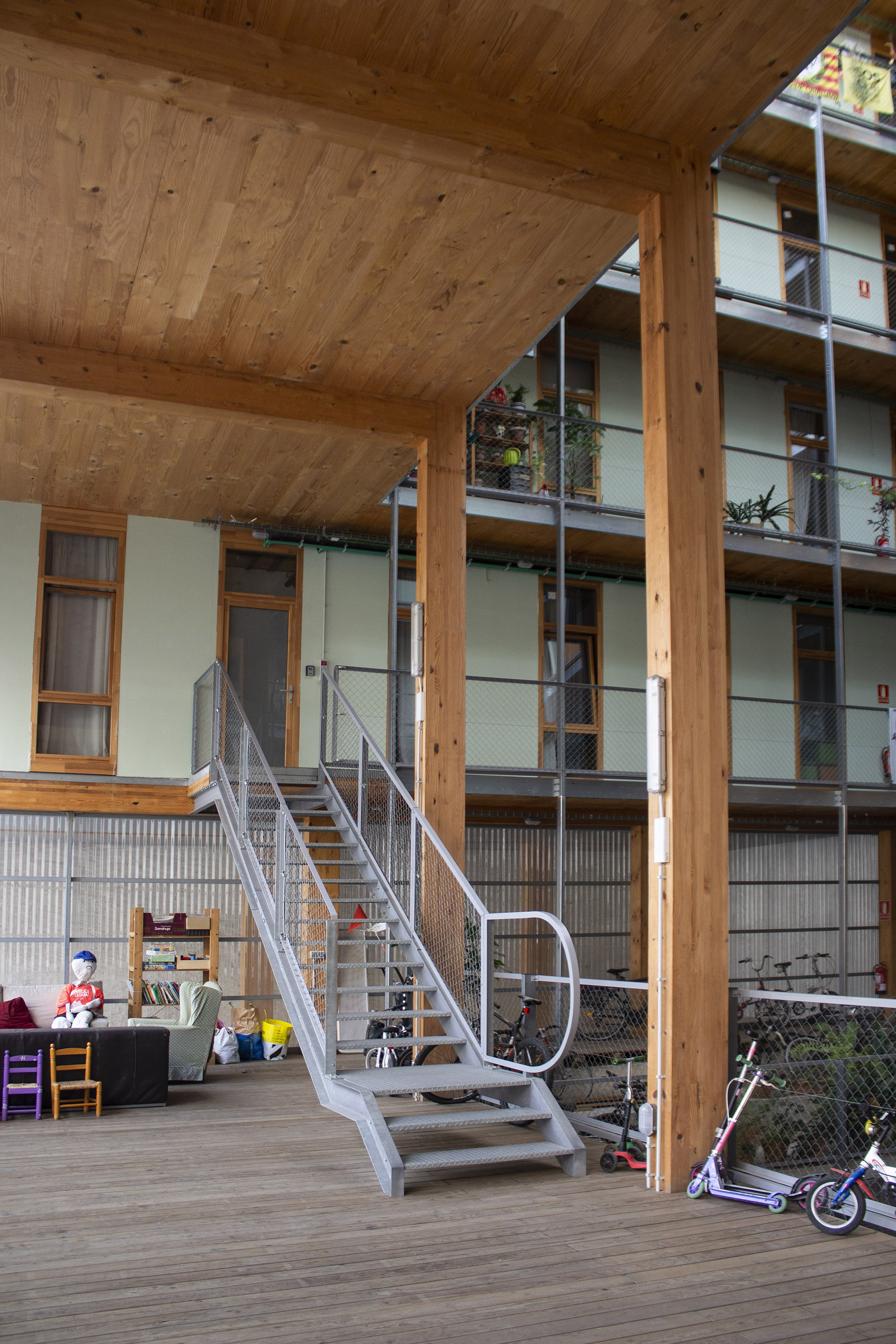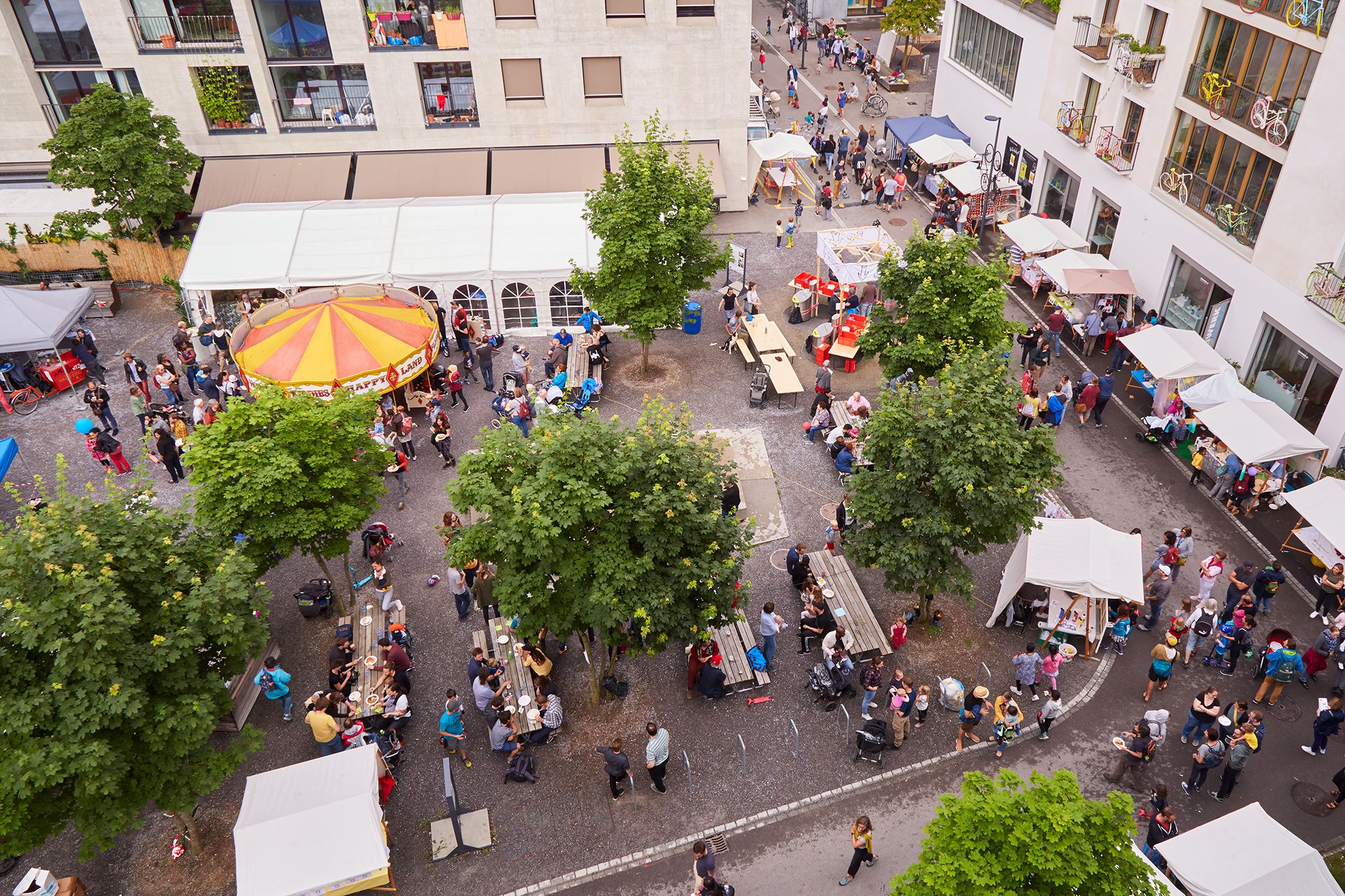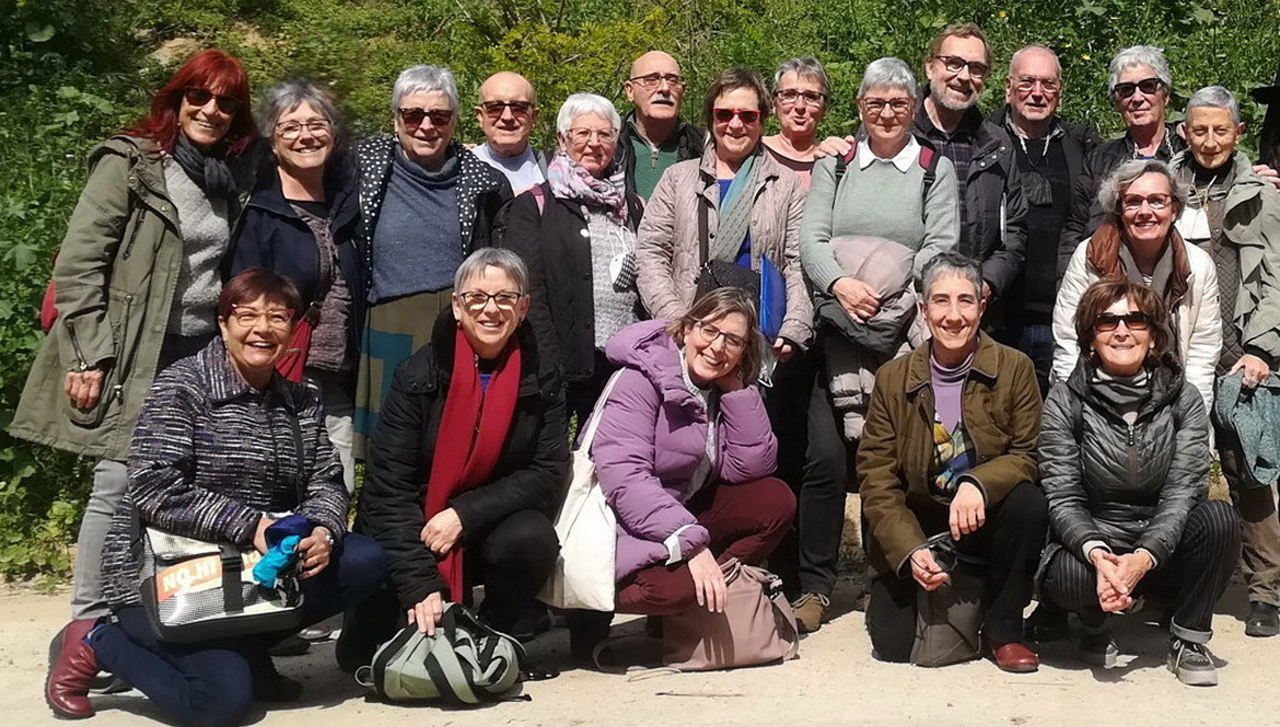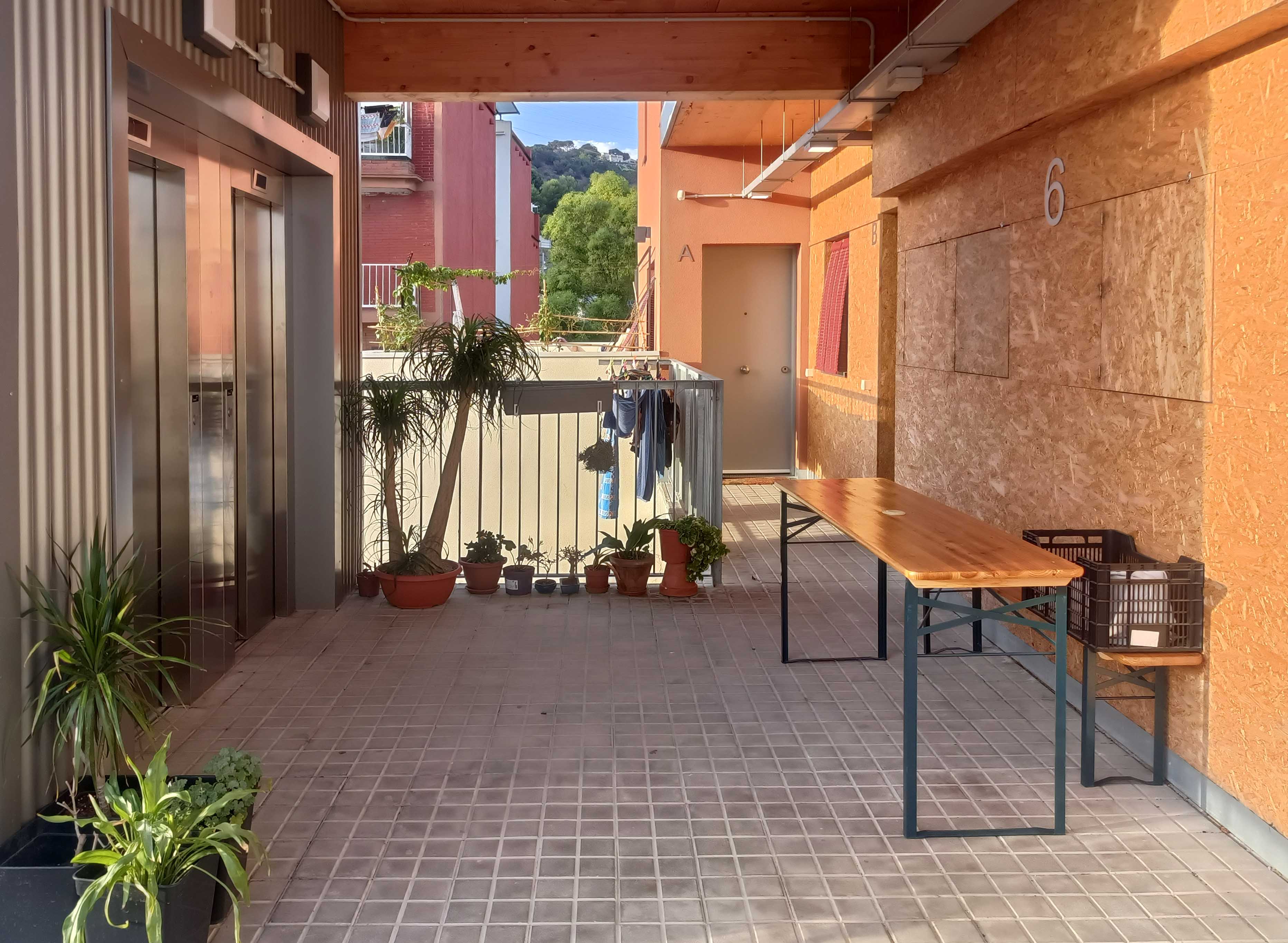
La Borda
Created on 16-10-2024
The housing crisis
After the crisis of 2008, it became obvious that the mainstream mechanisms for the provision of housing were failing to provide secure and affordable housing for many households, especially in the countries of the European south such as Spain. It is in this context that alternative forms emerged through social initiatives. La Borda is understood as an alternative form of housing provision and a tenancy form in the historical and geographical context of Catalonia. It follows mechanisms for the provision of housing that differ from predominant approaches, which have traditionally been the free market, with a for-profit and speculative role, and a very low percentage of public provision (Allen, 2006). It also constitutes a different tenure model, based on collective instead of private ownership, which is the prevailing form in southern Europe. As such, it encompasses the notions of community engagement, self-management, co-production and democratic decision-making at the core of the project.
Alternative forms of housing
In the context of Catalonia, housing cooperatives go back to the 1960s when they were promoted by the labour movement or by religious entities. During this period, housing cooperatives were mainly focused on promoting housing development, whether as private housing developers for their members or by facilitating the development of government-protected housing. In most cases, these cooperatives were dissolved once the promotion period ended, and the homes were sold.
Some of these still exist today, such as the “Cooperativa Obrera de Viviendas” in El Prat de Llobregat. However, this model of cooperativism is significantly different from the model of “grant of use”, as it was used mostly as an organizational form, with limited or non-existent involvement of the cooperative members.
It was only after the 2008 crisis, that new initiatives have arisen, that are linked to the grant-of-use model, such as co-housing or “masoveria urbana”. The cooperative model of grant-of-use means that all residents are members of the cooperative, which owns the building. As members, they are the ones to make decisions about how it operates, including organisational, communitarian, legislative, and economic issues as well as issues concerning the building and its use. The fact that the members are not owners offers protection and provides for non-speculative development, while actions such as sub-letting or transfer of use are not possible. In the case that someone decides to leave, the flat returns to the cooperative which then decides on the new resident. This is a model that promotes long-term affordability as it prevents housing from being privatized using a condominium scheme. The grant -of -use model has a strong element of community participation, which is not always found in the other two models. International experiences were used as reference points, such as the Andel model from Denmark and the FUCVAM from Uruguay, according to the group (La Borda, 2020). However, Parés et al. (2021) believe that it is closer to the Almen model from Scandinavia, which implies collective ownership and rental, while the Andel is a co-ownership model, where the majority of its apartments have been sold to its user, thus going again back to the free-market stock.
In 2015, the city of Barcelona reached an agreement with La Borda and Princesa 49, allowing them to become the first two pilot projects to be constructed on public land with a 75-year leasehold. However, pioneering initiatives like Cal Cases (2004) and La Muralleta (1999) were launched earlier, even though they were located in peri-urban areas. The main difference is that in these cases the land was purchased by the cooperative, as there was no such legal framework at the time. This means that these projects are classified as Officially Protected Housing (Vivienda de Protección Oficial or VPO), and thus all the residents must comply with the criteria to be eligible for social housing, such as having a maximum income and not owning property. Also, since it is characterised as VPO there is a ceiling to the monthly fee to be charged for the use of the housing unit, thus keeping the housing accessible to groups with lower economic power. This makes this scheme a way to provide social housing with the active participation of the community, keeping the property public in the long term. After the agreed period, the plot will return to the municipality, or a new agreement should be signed with the cooperative.
The neighbourhood movement
In 2011, a group of neighbours occupied one of the abandoned industrial buildings in the old industrial state of Can Batlló in response to an urban renewal project, with the intention of preserving the site's memory (Can Batlló, 2020; Girbés-Peco et al., 2020). The neighbourhood movement known as "Recuperem Can Batlló" sought to explore alternative solutions to the housing crisis of the time. The project started in 2012, after a series of informal meetings with an initial group of 15 people who were already active in the neighbourhood, including members of the architectural cooperative Lacol, members of the labour cooperative La Ciutat Invisible, members of the association Sostre Civic and people from local civic associations. After a long process of public participation, where the potential uses of the site were discussed, they decided to begin a self-managed and self-promotion process to create La Borda. In 2014 they legally formed a residents’ cooperative and after a long process of negotiation with the city council, they obtained a lease for the use of the land for 75 years in exchange for an annual fee. At that time, the group expanded, and it went from 15 members to 45. After another two years of work, construction started in 2017 and the first residents moved in the following year.
The participatory process
The word “participation” is sometimes used as a buzzword, where it refers to processes of consultation or manipulation of participants to legitimise decisions, leading it to become an empty signifier. However, by identifying the hierarchies that such processes entail, we can identify higher levels of participation, that are based on horizontality, reciprocity, and mutual respect. In such processes, participants not only have equal status in decision-making, but are also able to take control and self-manage the whole process. This was the case with La Borda, a project that followed a democratic participation process, self-development, and self-management. An important element was also the transdisciplinary collaboration between the neighbours, the architects, the support entities and the professionals from the social economy sector who shared similar ideals and values.
According to Avilla-Royo et al. (2021), greater involvement and agency of dwellers throughout the lifetime of a project is a key characteristic of the cooperative housing movement in Barcelona. In that way, the group collectively discussed, imagined, and developed the housing environment that best covered their needs in typological, material, economic or managerial terms. The group of 45 people was divided into different working committees to discuss the diverse topics that were part of the housing scheme: architecture, cohabitation, economic model, legal policies, communication, and internal management. These committees formed the basis for a decision-making assembly. The committees would adapt to new needs as they arose throughout the process, for example, the “architectural” committee which was responsible for the building development, was converted into a “maintenance and self-building” committee once the building was inhabited. Apart from the specific committees, the general assembly is the place, where all the subgroups present and discuss their work. All adult members have to be part of a committee and meet every two weeks. The members’ involvement in the co-creation and management of the cooperative significantly reduced the costs and helped to create the social cohesion needed for such a project to succeed.
The building
After a series of workshops and discussions, the cooperative group together with architects and the rest of the team presented their conclusions on the needs of the dwellers and on the distribution of the private and communal spaces. A general strategy was to remove areas and functions from the private apartments and create bigger community spaces that could be enjoyed by everyone. As a result, 280 m2 of the total 2,950 m2 have been allocated for communal spaces, accounting for 10% of the entire built area. These spaces are placed around a central courtyard and include a community kitchen and dining room, a multipurpose room, a laundry room, a co-working space, two guest rooms, shared terraces, a small community garden, storage rooms, and bicycle parking. La Borda comprises 28 dwellings that are available in three different typologies of 40, 50 and 76 m2, catering to the needs of diverse households, including single adults, adult cohabitation, families, and single parents. The modular structure and grid system used in the construction of the dwellings offer the flexibility to modify their size in the future.
The construction of La Borda prioritized environmental sustainability and minimized embedded carbon. To achieve this, the foundation was laid as close to the surface as possible, with suspended flooring placed a meter above the ground to aid in insulation. Additionally, the building's structure utilized cross-laminated timber (CLT) from the second to the seventh floors, after the ground floor made of concrete. This choice of material had the advantage of being lightweight and low carbon. CLT was used for both the flooring and the foundation The construction prioritized the optimization of building solutions through the use of fewer materials to achieve the same purpose, while also incorporating recycled and recyclable materials and reusing waste. Furthermore, the cooperative used industrialized elements and applied waste management, separation, and monitoring. According to the members of the cooperative (LaCol, 2020b), an important element for minimizing the construction cost was the substitution of the underground parking, which was mandatory from the local legislation when you exceed a certain number of housing units, with overground parking for bicycles. La Borda was the first development that succeeded not only in being exempt from this legal requirement but also in convincing the municipality of Barcelona to change the legal framework so that new cooperative or social housing developments can obtain an “A” energy ranking without having to construct underground parking.
Energy performance goals focused on reducing energy demands through prioritizing passive strategies. This was pursued with the bioclimatic design of the building with the covered courtyard as an element that plays a central role, as it offers cross ventilation during the warm months and acts as a greenhouse during the cold months. Another passive strategy was enhanced insulation which exceeds the proposed regulation level. According to data that the cooperative published, the average energy consumption of electricity, DHW, and heating per square meter of La Borda’s dwellings is 20.25 kWh/m², which is 68% less, compared to a block of similar characteristics in the Mediterranean area, which is 62.61 kWh/m² (LaCol, 2020a). According to interviews with the residents, the building’s performance during the winter months is even better than what was predicted. Most of the apartments do not use the heating system, especially the ones that are facing south. However, the energy demands during the summer months are greater, as the passive cooling system is not very efficient due to the very high temperatures. Therefore, the group is now considering the installation of fans, air-conditioning, or an aerothermal installation that could provide a common solution for the whole building. Finally, the cooperative has recently installed solar panels to generate renewable energy.
Social impact and scalability
According to Cabré & Andrés (2018), La Borda was created in response to three contextual factors. Firstly, it was a reaction to the housing crisis which was particularly severe in Barcelona. Secondly, the emergence of cooperative movements focusing on affordable housing and social economies at that time drew attention to their importance in housing provision, both among citizens and policy-makers. Finally, the moment coincided with a strong neighbourhood movement around the urban renewal of the industrial site of Can Batlló. La Borda, as a bottom-up, self-initiated project, is not just an affordable housing cooperative but also an example of social innovation with multiple objectives beyond providing housing.
The group’s premise of a long-term leasehold was regarded as a novel way to tackle the housing crisis in Barcelona as well as a form of social innovation. The process that followed was innovative as the group had to co-create the project, which included the co-design and self-construction, the negotiation of the cession of land with the municipality, and the development of financial models for the project. Rather than being a niche project, the aim of La Borda is to promote integration with the neighbourhood. The creation of a committee to disseminate news and developments and the open days and lectures exemplify this mission. At the same time, they are actively aiming to scale up the model, offering support and knowledge to other groups. An example of this would be the two new cooperative housing projects set up by people that were on the waiting list for la Borda. Such actions lead to the creation of a strong network, where experiences and knowledge are shared, as well as resources.
The interest in alternative forms of access to housing has multiplied in recent years in Catalonia and as it is a relatively new phenomenon it is still in a process of experimentation. There are several support entities in the form of networks for the articulation of initiatives, intermediary organizations, or advisory platforms such as the cooperative Sostre Civic, the foundation La Dinamo, or initiatives such as the cooperative Ateneos, which were recently promoted by the government of Catalonia. These are also aimed at distributing knowledge and fostering a more inclusive and democratic cooperative housing movement. In the end, by fostering the community’s understanding of housing issues, and urban governance, and by seeking sustainable solutions, learning to resolve conflicts, negotiate and self-manage as well as developing mutual support networks and peer learning, these types of projects appear as both outcomes and as drivers of social transformation.
Z.Tzika (ESR10)
Read more
->

Mehr als wohnen – More than housing
Created on 21-10-2024
The context
In Switzerland, housing cooperatives are private organisations, co-owned and self-managed. The city of Zurich has a rich history of housing cooperatives and non-profit housing associations dating back to the early 20th century, constituting 25% of the city’s housing stock. As was the case in other central European cities, housing cooperatives in Zurich emerged in response to a housing shortage and the unavailability of affordable prices. The model for establishing a housing cooperative is straightforward: individuals come together to form a cooperative, becoming shareholders. The cooperative builds housing and rents it to its members at cost prices. Since no profits are generated, and the land value is not increased for resale, the gap between cooperative rents and open market rents widens significantly over time. Historically, members of housing cooperatives were often affiliated based on profession or religion, such as public officers, for example.
The foundation of this housing cooperative model was laid in 1907 when a law was enacted, assigning responsibility to the municipality for providing ‘affordable and adequate housing’ (Hugentobler et al., 2016). The first housing cooperatives were established in 1910, and the Allgemeine Baugenossenschaft Zürich, ABZ, currently the largest cooperative in Switzerland, was founded in 1916. In the 1970s, cooperative housing faced a decline due to poor maintenance. However, a revival occurred in the 1980s when a new cooperative movement emerged. The new cooperatives aimed to break away from the rigidity, institutionalisation, and outdated principles of traditional housing cooperatives. The discourse of this movement emphasized the need for more sustainable living environments, affordable and non-speculative housing, and social integration. In 2011, a city-scale referendum took place, resulting in the population voting in favour of a law aiming to increase the proportion of non-profit housing to 33% of all housing (not just newly built homes) in the city by 2050. This legislation mandates the city of Zurich to establish a framework and instruments to support non-profit housing.
Process
In 2008, the Public Works Department of the city of Zurich and the cooperative Mehr als Wohnen launched an international competition for ideas. This initiative was part of the festivities marking 100 years since the inception of cooperative housing in Zurich (“Mehr als wohnen - 100 Jahre gemeinnütziger Wohnungsbau”). The competition sought innovative ideas about the future of non-profit housing. Out of 100 submissions, 26 teams of architects were selected and were invited to submit an urban development concept for the Hunziker Areal, including designs for residential buildings. A young team won the master plan competition, aiming to integrate diverse architectural proposals into a cohesive urban development concept. A subsequent dialogue phase ensued, during which architects and project operators collaborated to integrate various concepts into the master plan. Future residents and the broader public participated in 3 to 4 events annually, engaging in discussions about the neighbourhood’s future. The dialogic process continued until construction started in 2012.
Land
The four-hectare plot of disused industrial land at the Hunziker Areal in the Leutschenbach district was made available for building by the city administration. The site formerly housed a concrete industry until the 1980s when the company closed, and the city of Zurich acquired the land. Due to a law approved by a referendum in 2011, the city of Zurich is obligated to prioritize non-profit housing over selling land to the highest bidder. In 2007, the city council signed an agreement with the cooperative for a lease of 100 years, with the possibility of renewal. As part of the agreement, the cooperative must adhere to various conditions, including calculating rents based on investment costs, subsidizing 20% of the housing units, providing 1% of the ground floor for neighbourhood services at no cost to the city, allocating 0,5% of construction costs to local art projects, meeting high energy standards in construction, and launching an architectural competition for the new housing buildings. The cooperative pays an annual fee for the use of the plot, which is adjusted every five years, according to the cost-of-living index and interest rates. This fee also considers the space provided by the cooperative and the subsidies offered to low-income residents.
Funding
Following the agreement with the city council for the land, cooperative members embarked on securing funding. The members of the cooperative had to bring the 5,4% of the initial capital, with the remaining other 0.6% covered by the municipality. The founding cooperatives of Mehr als Wohnen leveraging their existing resources and expertise, contributed half of this amount. The other half was covered by the future residents, amounting to CHF 250/m2 as their member equity. For low-income households or elderly people, the city’s social services could cover this amount.
The remaining funding was obtained from three levels of administration: city, canton and federal. At the federal level, the Federation of Swiss Housing Cooperatives provided a CHF 11 million loan through its revolving fund, offering a twenty-year term with a 1% interest rate. Additionally, at the federal level, CHF 35 million was secured through a bond loan with fixed interest rates for the first twenty years, facilitated by the Bond Issuing Cooperative for Limited Profit Housing (Emissionszentrale für gemeinnütziger Wohnbauträger/ Centrale d’émission pour la construction de logements – EGW/CC) and public subsidies. EGW functions as a financing instrument for housing projects of public interest, guaranteeing loans through the Swiss Confederation (Federal Bureau of Housing) to provide security for investors. Nonprofits benefit from significantly more advantages compared to comparable fixed mortgages with the same terms. At the cantonal level of Zurich, the project secured a CHF 8 million loan, and at the municipal level, another of CHF 8 million, both with fixed interest rates. However, instead of paying the interest to the city and canton of Zurich, the cooperative uses this amount to subsidize 20% of housing units (80 of the 370 apartments). To complete its financial planning, Mehr als Wohnen also secured a CHF 8 million loan from the city of Zurich’s pension fund, with a fixed interest rate. With this combination of sources, providing 27% of the total investments, the remaining necessary financing was obtained from a consortium of four banks through traditional mortgage loans.
Inclusion mechanisms
Mehr als Wohnen employs a mechanism commonly used by many Swiss housing cooperatives, that allows its members to transfer their savings to the cooperative instead of keeping them in traditional banks. These “member funds” constitute part of the cooperative’s capital, meaning that the larger the member funds are, the less the cooperative will rely on mortgages in the future. Members who invest in their cooperatives benefit from a higher investment return compared to what they would receive at a conventional bank. The cooperative also maintains an internal solidarity fund, aiding in financing solidarity projects or assisting families facing difficulties in paying their equity. Every household and commercial store contributes a monthly amount, ranging from 10 to 30 CHF, depending on their income. Through this fund, the cooperative can reduce monthly rents for low-income households, cover maintenance or adaptation fees, organise events, and provide financial support to cooperative projects in the neighbourhood or abroad.
Design innovations
The project is planned for a mixed-residential population and a diverse mix of uses. The term “more” in its name signifies the aim of creating a sense of community and belonging, which is reflected in the interior as well as exterior spaces. The concept revolves around reducing private spaces, with an average of 35 m2 per person for tenants, while providing increased communal areas, such as roof terraces, children’s playgrounds, and car-free spaces. In terms of private spaces, Mehr als Wohnen incorporates various housing typologies to accommodate diverse needs, including cluster apartments, satellites, family apartments, large units capable of housing 7 to 12 individuals, studios and spaces that can be adapted to different purposes. The apartments range from 2 to 7.5 rooms[1], offering a broad spectrum for exploring different residential possibilities. These combinations of spaces highlight diverse household compositions and lifestyles, acknowledging the simultaneous desire for privacy and communal living. Most of the apartments have 4-4.5 rooms (37%), followed by 3-3.5 room apartments (26%), and larger apartments with 5.5 rooms or more (22%). Apartments with 1 to 2.5 rooms account for only 15%, which is a smaller percentage compared to the city of Zurich, where this category represents 34%.
lusion
The aim was to create a “lively quarter where people like to live, work and spend their free time” and should be offered to people from “all social strata” (as stated in Mehr als Wohnen’s mission statement). The aim of the project was that the composition of the residents in the project should reflect the distribution of different households from the canton of Zurich as a whole. In order to achieve a mixed population, the cooperative collaborated with various institutions. A total of 10% of the apartments were reserved for the Züriwerk Foundation, supporting people with impairments; the Domicil Foundation, assisting families with immigrant backgrounds in finding housing; the Woko Cooperative, aiding teachers and students; and the ZKJ Foundation, finding homes for children who could not live with their families.
[1] In Switzerland and Germany, the count of rooms per apartment encompasses more than just bedrooms; it includes any kind of room present in the apartment. The term "half room" typically refers to spaces that aren't fully designated as bedrooms, such as a living room that could potentially be converted into one. It's important to note that bathrooms and toilets are not included in this room count.
Z.Tzika (ESR10)
Read more
->

Can70 senior cooperative housing: Aging in community
Created on 22-04-2025
Community-led housing projects
The Can70 project exemplifies the significance of community-led housing initiatives, where residents actively participate in the decision making from initiation and planning to development. By engaging in the initial design and subsequent development stages, residents gain a profound sense of ownership. This involvement ensures that the project aligns with the values and aspirations of the dwellers. The community has established a governance structure to facilitate their participation, emphasizing consensus within the general assembly. This structure is composed of five commissions -community, governance, economy, architecture, and external affairs- which play pivotal roles in ensuring effective project management and community engagement. While residents take the lead, they still require resources, public support, and technical assistance to bring the project to fruition. The cooperative Sostre Civic has guided them in navigating legal, economic, and communication aspects with the public sector. This collaborative effort underscores the importance of synergy between community-driven initiatives and external expertise.
Care and mutual support
The community has recognized the importance of incorporating care and mutual support into their co-living model. Their goal is to live in an environment where their members actively support one another, creating a safety net that enhances well-being and quality of life. Through organized activities, informal interactions, and shared responsibilities, care will become an integral part of their daily lives. This way of living together contrasts with the institutionalization of senior care in nursing homes, which the members of Can70 aimed to avoid. Maintaining their autonomy while being part of a supportive community was a key motivation for the group. A significant aid in researching the connection between housing and care was the two-year effort to write the "Guide of Care in the Coliving of Elderly People." This project was supported by a grant from the Department of Elderly People of the City Council of Barcelona. Initially awarded for one year, the grant was extended for a second year. The group systematically explored what care means to them, and the resulting guide is available for everyone to consult, aiding new groups in similar endeavors.
Innovative living forms
The project integrates innovative architectural design and spatial distributions. The building features a spectrum of spaces ranging from private to public, enabling residents to utilize them in diverse ways. The publicly accessible areas of the building connect it with the neighbourhood, communal spaces foster socialization among the building’s inhabitants, and semi-private spaces act as thresholds between public and private realms, giving rise to a smaller nuclei of cohabitation within the building. Since residents plan to live there for the rest of their lives, an important decision was to have single-person units, even for couples. In that way, the person who loses a partner will not have to change their living unit and can continue living in their familiar environment. The group incorporated many apartments using the cluster typology, 4-5 private units of 30m² —each with a bathroom, bedroom, and small kitchenette— around a shared space of 50m², equipped with a kitchen, dining area, and small living room. This layout facilitates easier mutual care within smaller groups. It was also decided to include some conventional 45m² apartments for those who prefer less shared living arrangements. Finally, the building includes various communal spaces, including a shared kitchen, a reading area, and a day centre. An important feature is a semi-open communal space on every floor next to the vertical communication areas, enabling residents to socialise on each floor and seamlessly integrating communal spaces throughout the building.
Relationship to urban environment
The objective of the community has been to create a housing project integrated within the neighbourhood. Since the project is being developed on public land, one requirement of the city council for granting the land to the cooperative was to include public spaces on the ground floor. The group embraced this condition, having already envisioned areas open to the community. The building's ground floor will feature spaces accessible to the public during specific hours, including facilities for physiotherapy, potentially hydrotherapy, a day centre, and care services. Additionally, there will be activities open to the neighbourhood, such as discussions and presentations on well-being and elderly care, as well as storytelling sessions for young children. This approach ensures that the project's social impact extends beyond its residents, fostering social bonds and connections within the local community.
Environmental and social sustainability
From the outset, the group prioritized the project's environmental sustainability, which was evident in the decisions concerning the building's bioclimatic design, construction system, energy efficiency, and shared resources among residents. In collaboration with the architects, Peris+Toral, they chose compressed earth blocks for construction, a material that maintains a stable internal temperature and minimises the need for mechanical cooling or heating systems, thus reducing the environmental footprint of the building. Initially, the group considered using a wooden construction system (CLT), inspired by projects like La Borda in Barcelona. However, rising material cost of wood necessitated a plan change showcasing the group’s flexibility and commitment to find a sustainable solution. Sustainability is also reflected in the project’s various shared resources. The community plans to share daily meals in the communal dining area on the ground floor. Additionally, the clusters of the housing units will include a shared kitchen for four to five residents living together, allowing them to share groceries and take turns cooking. Furthermore, residents will also share laundry facilities. These decisions collectively enhance the project's overall sustainability and foster a strong sense of community.
Societal impact
Can70 will achieve a significant societal impact by envisioning and materializing an alternative model for ageing in the community. The group has created a co-housing project based on autonomy and mutual support among residents, demonstrating the crucial role of community participation in all project phases. This innovative approach highlights the benefits of co-living arrangements for the elderly, where shared responsibilities and collective decision-making contribute to a higher quality of life and increased well-being. In addition to providing a successful model for communal living, the project has also contributed to transform the current legal framework. Can70 has been the first senior project to be incorporated under the grant-of-use scheme, setting a precedent for future initiatives of older communities. This legal recognition paves the way for developing similar projects, allowing the scaling up of senior co-housing.
Z.Tzika (ESR10)
Read more
->





